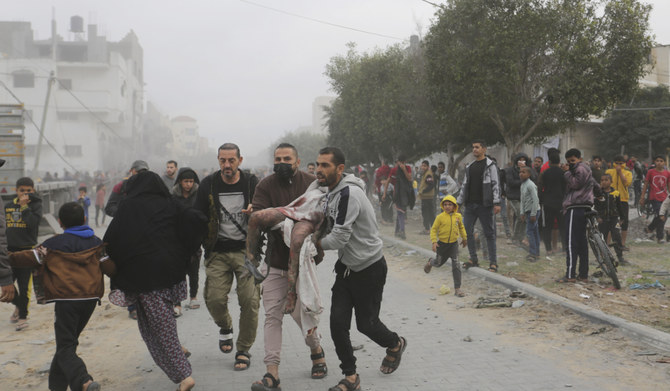CAIRO: Egypt’s foreign ministry on Monday condemned as “disgraceful” and “irresponsible” comments by Israel’s far-right Finance Minister Bezalel Smotrich who claimed Cairo has “considerable responsibility” for Hamas’s October 7 attack.
Smotrich said during a Monday meeting of his Religious Zionism party that “the Egyptians bear considerable responsibility for October 7,” according to Israeli public broadcaster Kansas.
The attack by Palestinian militants on that day resulted in the deaths of more that 1,160 people in Israel, mostly civilians, according to an AFP tally based on official figures, and triggered war which has raged for more than four months.

Ahmed Abu Zeid. (Twitter @MfaEgypt)
Israel’s relentless military offensive in the Hamas-ruled Gaza Strip has killed at least 28,340 people, most of them women and children, according to the territory’s health ministry.
Smotrich claimed that “much of Hamas’s armaments pass through Egypt,” which shares a border with Gaza and has been a key mediator in efforts to end the fighting.
In a statement, Egyptian foreign ministry spokesman Ahmed Abu Zeid said it was “unfortunate and disgraceful” for the Israeli minister to “continue releasing irresponsible and inflammatory statements.”
“Egypt fully controls its territory, and does not allow any party to involve Egypt’s name in failed attempts to justify its own shortcomings,” he said.
Egypt in 1979 became the first Arab nation to sign a peace treaty with Israel and has long served as a mediator in the Israeli-Palestinian conflict.
Along with Qatar, it helped broker a week-long truce in November that saw the release of hostages in exchange for Palestinian prisoners held by Israel, and more aid deliveries into Gaza.
Israel’s offensive has pushed more than half of the besieged Gaza Strip’s 2.4 million people into vast tent cities in the southern city of Rafah on the Egyptian border.
Israel has begun to focus on Rafah as its most recent target, with worries of a looming Israeli ground incursion.
Israeli strikes pounded the city overnight, killing around 100 people, the health ministry said Monday, coinciding with an Israeli operation that freed two hostages.
Egypt’s Al-Qahera News network, which is linked to state intelligence, said Cairo is “closely following the situation” in Rafah, and “is ready to deal with every scenario.”
The foreign ministry spokesman said Smotrich’s remarks reflect “a ravenous hunger for killing and destruction, and sabotage of any attempt to contain the crisis in the Gaza Strip.”
























